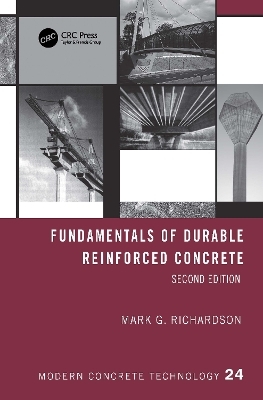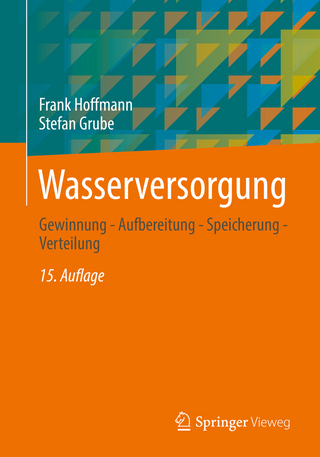
Fundamentals of Durable Reinforced Concrete
Seiten
2023
|
2nd edition
CRC Press (Verlag)
978-1-032-19905-4 (ISBN)
CRC Press (Verlag)
978-1-032-19905-4 (ISBN)
This covers reinforcement corrosion, carbonation, chloride ingress, alkali-aggregate reaction, freeze/thaw, sulfate attack, acid and seawater attack, cracking, abrasion, erosion, cavitation and weathering. With international standards, probabilistic design, mathematical modelling of deterioration mechanisms and performance-based tests.
This new edition sets out the fundamental aspects of concrete durability with an emphasis on sustainability and carbon neutrality through performance-based methodologies. Global approaches to managing durability are explained from both a prescriptive and performance viewpoint. Achieving a balance between the interactive factors influencing durability and sustainability is supported by an explanation of the physical and chemical phenomena at play, determination of key performance parameters by mathematical modelling and physical testing, and current guidance for good practice. New chapters and sections examine the holistic approach to durability and significant aspects of traditional and new cementitious systems. The full range of threats to durability are covered in this single volume, including reinforcement corrosion, carbonation, chloride ingress, freeze-thaw effects, sulfate attack, acid and seawater attack, alkali-aggregate reaction, cracking, abrasion, erosion, cavitation, and weathering.
The book presents a framework for specification through internationally adopted codes and standards and summarises the background to probabilistic approaches to durability design, providing a state-of-the-art review of mathematical modelling of deterioration mechanisms along with current directions in test methods for performance-based specifications.
Fundamentals of Durable Reinforced Concrete is an essential reference on concrete durability for specifiers and researchers and is also accessible to undergraduate students.
This new edition sets out the fundamental aspects of concrete durability with an emphasis on sustainability and carbon neutrality through performance-based methodologies. Global approaches to managing durability are explained from both a prescriptive and performance viewpoint. Achieving a balance between the interactive factors influencing durability and sustainability is supported by an explanation of the physical and chemical phenomena at play, determination of key performance parameters by mathematical modelling and physical testing, and current guidance for good practice. New chapters and sections examine the holistic approach to durability and significant aspects of traditional and new cementitious systems. The full range of threats to durability are covered in this single volume, including reinforcement corrosion, carbonation, chloride ingress, freeze-thaw effects, sulfate attack, acid and seawater attack, alkali-aggregate reaction, cracking, abrasion, erosion, cavitation, and weathering.
The book presents a framework for specification through internationally adopted codes and standards and summarises the background to probabilistic approaches to durability design, providing a state-of-the-art review of mathematical modelling of deterioration mechanisms along with current directions in test methods for performance-based specifications.
Fundamentals of Durable Reinforced Concrete is an essential reference on concrete durability for specifiers and researchers and is also accessible to undergraduate students.
Mark G. Richardson is Professor Emeritus and formerly Head of the School of Civil Engineering at University College Dublin.
1. Durable concrete: the why and the how. 2. The prescriptive approach. 3. Durability design and the performance route to specification. 4. Permeability of traditional and innovative concretes. 5. Corrosion of reinforcement in concrete. 6. Carbonation. 7. Chloride ingress. 8. Freeze-thaw effects. 9. Chemical attack: sulfates. 10. Chemical attack: leaching, acid and seawater attack. 11. Alkali–aggregate reaction. 12. Cracking in reinforced concrete structures. 13. Abrasion, erosion and cavitation. 14. Weathering and efflorescence.
| Erscheinungsdatum | 07.11.2023 |
|---|---|
| Reihe/Serie | Modern Concrete Technology |
| Zusatzinfo | 18 Tables, black and white; 90 Line drawings, black and white; 7 Halftones, black and white; 97 Illustrations, black and white |
| Verlagsort | London |
| Sprache | englisch |
| Maße | 156 x 234 mm |
| Gewicht | 910 g |
| Themenwelt | Naturwissenschaften ► Biologie ► Ökologie / Naturschutz |
| Technik ► Bauwesen | |
| Technik ► Umwelttechnik / Biotechnologie | |
| ISBN-10 | 1-032-19905-9 / 1032199059 |
| ISBN-13 | 978-1-032-19905-4 / 9781032199054 |
| Zustand | Neuware |
| Informationen gemäß Produktsicherheitsverordnung (GPSR) | |
| Haben Sie eine Frage zum Produkt? |
Mehr entdecken
aus dem Bereich
aus dem Bereich
Planung · Recht · Verfahren
Buch | Hardcover (2024)
Springer Vieweg (Verlag)
64,99 €
Gewinnung - Aufbereitung - Speicherung - Verteilung
Buch | Softcover (2022)
Springer Vieweg (Verlag)
39,99 €


